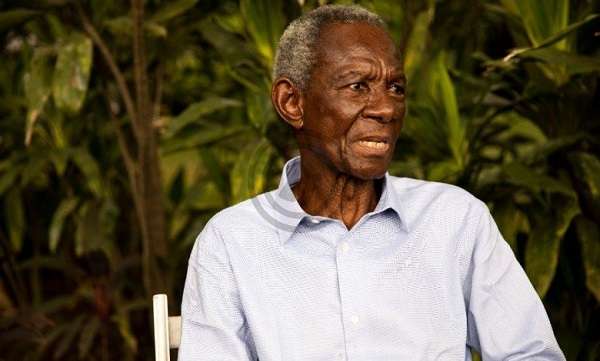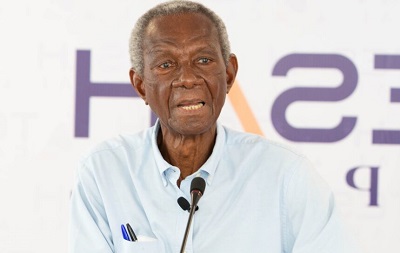A distinguished Ghanaian Economist and Statesman Mr. Kwame Pianim shared deep thoughts on Ghana’s democratic journey, the challenges faced, and the need for responsible leadership. Speaking candidly, Mr. Pianim offered a reflection on how democracy in Ghana has evolved, expressing optimism about its future and issuing a cautionary note to the younger generation.
Mr. Pianim began by stating that democracy is an “aspirational” concept—one that every generation must nurture. He emphasized that the foundation of democracy rests on maintaining independence and freedom, particularly freedom of speech while respecting the rights of others. In his view, “democracy is always aspirational.” He drew a symbolic line, noting that “your right to swing your arm should end where my nose begins,” highlighting the delicate balance between individual freedoms and collective responsibility.
Mr. Pianim acknowledged that Ghana has done relatively well in its democratic progress. “We haven’t had a civil war like other African countries. We have elections.” However, he quickly clarified that democracy is not merely about holding elections, but about ensuring that citizens are educated on the issues at hand and can actively participate in governance.
“Democracy is not about elections. It’s about educating the people so that they know the issues properly.”
“Demonstrations are an integral part of democracy. We go out and tell the government, maybe you are not hearing. We are sitting by the fire. We know where it’s burning.”
Mr. Kwame Pianim Economist and Statesman
Mr. Pianim expressed admiration for those who take risks to speak truth to power, and after all, Ghanaians are to be grateful to those who risk their job, their life, and their limbs to go onto the streets to demonstrate.
Democracy: A Work in Progress
Mr. Pianim dismissed the notion that Ghana’s democracy is in decline and the notion that democracy has failed and should be abandoned.
“When I hear young people say that oh, we are tired of democracy, we are tired of this party system, people in South Africa are calling for the whites to come back and people are saying when is this democracy going to end? We have to make it work.”
Mr. Kwame Pianim Economist and Statesman
He stressed that the democratic process allows Ghanaians to hold leaders accountable.
“Every four years, the good people of Ghana are called to say, do you want to renew their lease? The answer is no, you go. Somebody else comes.”
Mr. Kwame Pianim Economist and Statesman
This, Mr. Pianim noted, gives the people the ultimate power, and it is a right that should never be taken for granted.

The Perils of Military Intervention
Mr. Pianim also addressed the dangerous appeal of military intervention, particularly among some younger citizens who have grown disillusioned with the current democratic system. He strongly advised against this, saying, “Look, we have seen military intervention. What does it do? It takes us back.” He recalled the violent events of the past, including the coups and revolutions that led to bloodshed and instability.
“What was the Rawlings revolution? it was the youth, they did worse than the Kenyans. They killed us. They shot us on the street. They sprayed us with gas.”
Mr. Kwame Pianim Economist and Statesman
He reiterated that military intervention is only justified when the democratic process is being obstructed.
Mr. Pianim warned that the consequences of military rule are far worse than the challenges faced in a democratic system. He emphasized; “We’ve been there before. Our democracy has survived this.”
Lessons from the Past and Responsibility of the Youth
Addressing the younger generation, Mr. Pianim stressed their role in shaping Ghana’s future. He pointed out that those under 50 years of age make up the majority of the population and have the power to determine the country’s leadership.
However, he cautioned against voter apathy and the sale of votes.
“If they go and sell their vote, then we, the old men, will be there to do our foolishness.” Drawing from his personal experiences, Mr. Pianim recalled the words of a political figure who once said, “Those of you wise people, if you don’t participate, and we, the fool, get elected, and we go and we are doing our foolishness, don’t talk.”
Mr. Pianim reiterated the importance of protecting Ghana’s democratic freedoms, even at the expense of rapid development. He criticized the idea of sacrificing freedom for development.
“I don’t want to live in Kagame’s Rwanda… If I spoke against Kagame and I ran away to South Africa, he’s going to come and kill me.”
Mr. Kwame Pianim Economist and Statesman
For Mr. Pianim, freedom is non-negotiable. He and others who formed the New Patriotic Party (NPP) firmly believe in “development in freedom.” He emphasized, “We develop as long as you are free because freedom is vital to our democracy.”
A Call to Preserve Democracy
Mr. Kwame Pianim’s remarks served as a powerful reminder of the value of democracy, the importance ofcivic participation, and the need to protect freedoms.
He urged Ghanaians, particularly the youth, to take an active role in the country’s governance and to resist the allure of authoritarianism. Mr. Pianim’s message was clear: democracy is a work in progress, and it is up to the people to make it work.










Discussion about this post